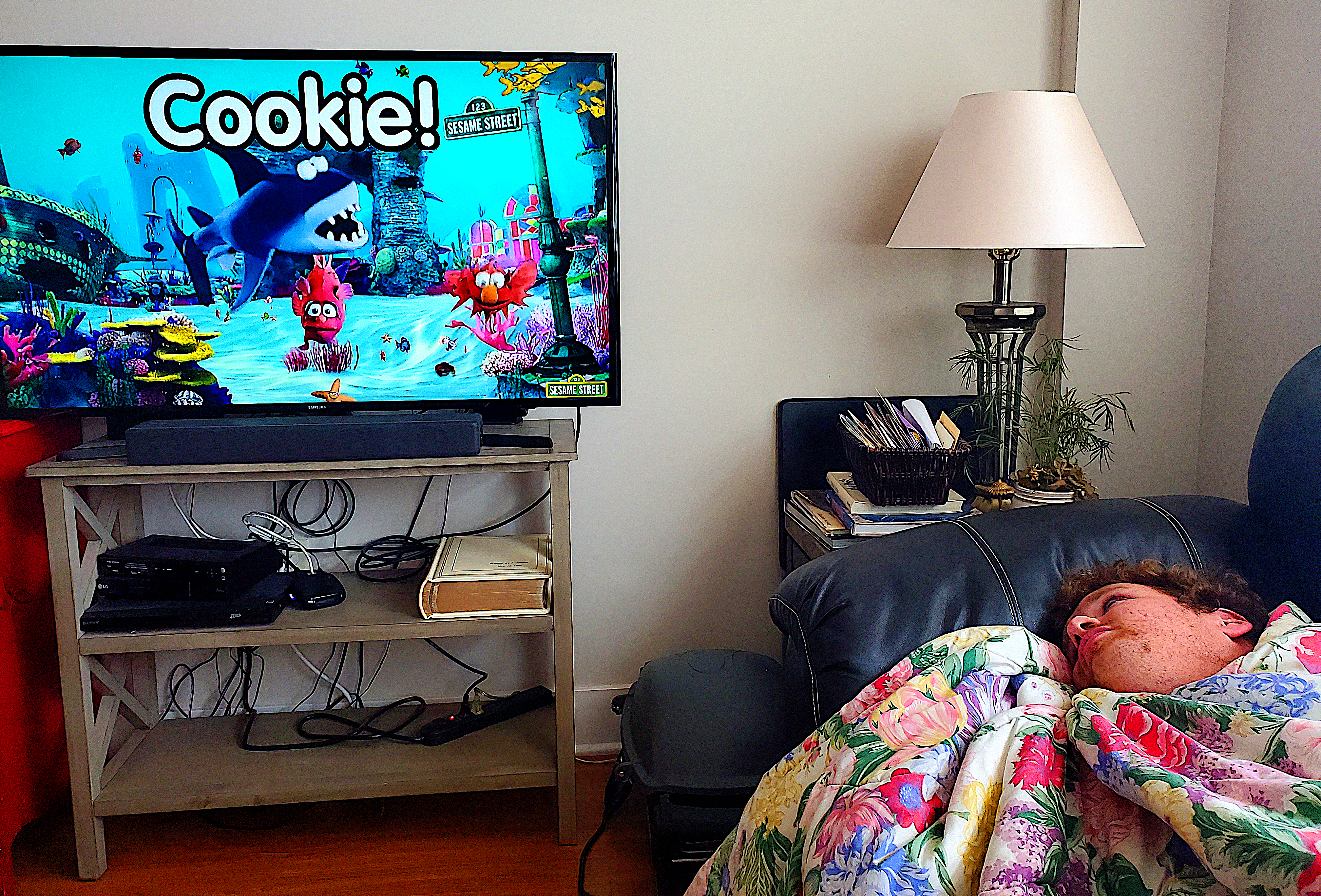Severe autism comes with an endless supply of heartbreaks, big and tiny. And many involve difficulties communicating wants and needs.
Ben went into our bedroom during a recent visit and yanked the comforter from our bed and left it on the floor — the type of thing that happens all the time with the big guy. One of Ben’s favorite recreational activities is making messes; He would be an Olympic gold medalist if medals were offered for Mess Making. To Ben, kitchen and bedroom drawers and cabinets and boxes are meant to be opened (especially if we are visiting someone for the first time), and their contents often “relocated” to the floor. Why? As is often the case with autism, it’s easier to not ask Why, but ask, Why Not?
So our cover ended up on the bedroom floor. Why not?
But this time, we actually figured out a Why. Of course, there is always an answer to Why, whether or not we know what it is. But often, maybe most often, things like the cover-toss don’t really have a purposeful answer, beyond that gravity simply provides cheap and plentiful entertainment.
One of our frequent activities when Ben was younger and lived at home was “squeezes,” aka, deep pressure. Have you noticed the boom in weighted blankets lately? Not just for autism, but for all? The TV commercials tout the calm and well-being, and blissful sleep that they give you, supposedly from the boost in serotonin the “deep pressure” that weighted blankets provide. Once exotic, and expensive, available mainly through specialty outlets catering to Physical and Occupational Therapists, now Target carries them, and for for a heck of a lot less. In fact, deep touch pressure therapy (DTP) has become a standard tool for OTs.
But Ben’s always had his own version of DTP and a weighted blanket. Me.
“Squeeze,” he would say as he laid face down on a bed or couch, and I would lie on top of him, from head to toe. I am 6’5”, and not thin. I make one heck of a weighted blanket.
And he liked to have a blanket over him, completely cocooning his entire body, with only his face visible. (Yeah, pretty cute.) After the minute or so of “squishy squeeze,” he would often stay covered up, sometimes drawing his face under the cover, becoming his version of Yertle the Turtle.
So, Ben’s relationship with blankets is a deep one that goes way back.
The other day, he started to lie on the couch, and I thought he might want to be covered up, and maybe squeezed. But when I started to cover him with a blanket, he pushed it away and got up, and resumed walking around the apartment, from room to room, closet to closet to drawer to cabinet to refrigerator (his favorite place for exploration). It was during this trek that the bedroom blanket was repurposed as a rug.
At one point, he looked at me and said, “Square.” We had no idea what this meant, but it was different from the scripting of lines from books and videos he is usually reciting, and his fleeting eye contact meant this REALLY was something important to him. I said, “What?” Ben repeated, “Square.”
Now that was also significant. Most of the time when we ask, “What?”, he doesn’t respond, which means it was self-talk and not meant to communicate with us. If Ben does repeat what he said, that is very different. It means he wants to convey something, often a desired food or activity. (“Go to Target,” or “McDonald’s,” “Disney Channel Holiday,” or “Go to the car,” etc.)
But “Square”? That was a new one. And it was frustrating, because we knew Ben wanted us to know something, or to do something for him, but as is so often the case, after decades of experience and practice, we were still wondering what it was he was trying so hard to convey. Sherlock Holmes would find Moriarty’s capers child’s play in comparison to Ben’s mysteries, and to autism’s endless, putrid puzzles.
And that, my friends, is where the heartbreak lies. Sometimes we can’t understand the word or words themselves, and we try different ones. He doesn’t lose his patience, and tries harder to enunciate, or says it a little louder. When we do finally get it, sometimes a brief, little grin follows, and a visible sense of relief. But when we don’t get it, after many attempts, Ben quietly gives up. And our hearts break.
If you’ve ever been in a foreign country, trying to speak their language, and you land on a word or phrase that the other person just doesn’t get, it can drive you nuts, especially if it’s important. But at least you can go back home to the ease of your native tongue.
This IS Ben’s native tongue. He doesn’t have that place where communication comes easy. It is never easy. And it often fails.
And “Square” failed — at first.
At one point, Ben went back to the couch and started to lie down again. This time, when I picked up a blanket, he pushed it away. And then he said “Square” again.
The EUREKA moment!
Ben DID want squeezes, and he DID want to be covered. But just not with THAT cover. He wanted the big, luxurious comforter we had on our bed. And since it was a cover for, not a twin bed, but a king size bed, it was a big SQUARE cover. And he had already tried to let me know by pulling it to the floor.
When I came back in the room with the square cover, Ben immediately rolled onto his stomach and said, “Squeeze.” All was well in his world.
After our little session of squeezes, he pulled the covers around him for a session of Sesame Street.
And “Cookie” is one word that requires no sleuthing.

